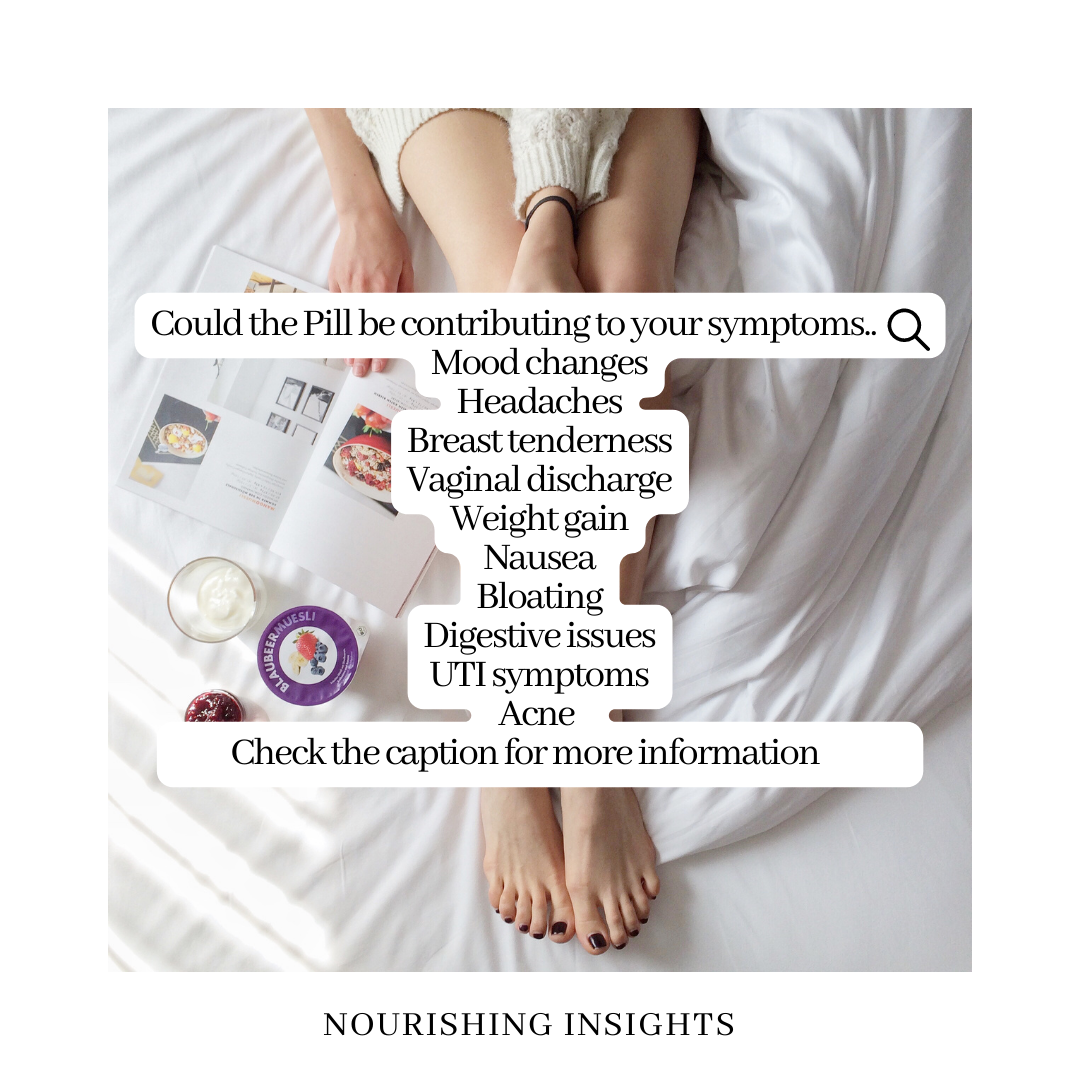|
Have you experienced any of these symptoms while on the Oral Contraceptive Pill?
● Mood changes ● Headaches ● Breast tenderness ● Vaginal discharge ● Weight gain ● Nausea ● Bloating ● Digestive issues ● UTI symptoms ● Acne The pill can often be the first port of call for many doctors when dealing with symptoms associated with a woman's menstrual cycle, but many of these symptoms can be related to hormonal imbalances which are more often that not masked by the pill or in some cases can be exacerbated by it. Did you know that the pill is associated with some risk factors that can affect how you feel? 1. The Oral Contraceptive Pill can affect your body's ability to absorb many nutrients. It has been associated with lower levels of vitamins B6, B12, and folate, magnesium, zinc, vitamin C and selenium. All these nutrients are required for optimal hormonal balance, they are also essential for optimal liver function, which can impact on how hormones are metabolised in the body. 2. The OCP can impact and even alter your metabolism. When this happens, you may gain weight even if your diet and exercise routines haven't changed. (1) 3. Certain birth control including the OCP can increase insulin levels. High levels of insulin cause any calories obtained from carbohydrates to be stored in fat cells. It has been shown in studies that women who already have abnormal glucose metabolism are at high risk of experiencing this side effect. (2) 4. The OCP can alter the expression on neurotransmitters. GABA is known for producing a calming effect, It gets synthesised when progesterone is broken down in the body and has the effect of kick starting action by your GABA receptors. Unfortunately the artificial progestins in the contraceptive pill don’t seem to offer this same benefit. In fact, research suggests that women on the pill may have lower levels of GABA. 5. Studies have also shown that changes in dopamine and serotonin signalling may also play a role in mood-related changes seen while on the pill. Dopamine and serotonin, like GABA, are neurotransmitters. 6. One study showed that women were 23% more likely to start taking antidepressants for the first time than non-OCP users, this is increased in teenage girls (3) 7. The use of oral contraceptives has been shown in studies to modify intestinal permeability and enhance the development of Th1- and Th2- mediated inflammatory diseases. (4) 8. Several studies have shown that Contraceptive use is a significant risk factor for acquiring urinary tract infections (5) 9. The OCP has been shown to lower serum magnesium levels. Magnesium is a cofactor in over 600 enzymatic reactions in the body and has many important roles. It is essential for regulating mood, maintaining a healthy heartbeat to support sleep, muscle and nerve function along with energy production. (6) If you have experienced any of these symptoms, would like to discuss alternatives or are worried about any issues regarding your menstrual cycle, then please do get in touch for a free 15 minute discovery call with either Beverley or Neleta at Nourishing Insights. Both Beverley and Neleta have many years of experience working with women and girls to support hormonal balance, help reduce symptoms of PMS, PMDD and also manage symptoms associated with endometriosis, fibroids and PCOS. 1.Cortés, M.E. and Alfaro, A.A. (2014) ‘The effects of hormonal contraceptives on glycemic regulation’, The Linacre Quarterly, 81(3), pp. 209–218. doi:10.1179/2050854914y.0000000023. 2.Wang, Q. et al. (2016) ‘Effects of hormonal contraception on systemic metabolism: Cross- sectional and longitudinal evidence’, International Journal of Epidemiology, 45(5), pp. 1445–1457. doi:10.1093/ije/dyw147. 3.Skovlund, C.W. et al. (2016) ‘Association of hormonal contraception with depression’, JAMA Psychiatry, 73(11), p. 1154. doi:10.1001/jamapsychiatry.2016.2387. 4. Khalili, H. (2015) ‘Risk of inflammatory bowel disease with oral contraceptives and menopausal hormone therapy: Current evidence and future directions’, Drug Safety, 39(3), pp. 193–197. doi:10.1007/s40264-015-0372-y. 5. Dienye, P.O. and Gbeneol, P.K. (2011) ‘Contraception as a risk factor for urinary tract infection in Port Harcourt, Nigeria: A case control study’, African Journal of Primary Health Care & Family Medicine, 3(1). doi:10.4102/phcfm.v3i1.207. 6. Palmery (2023) ‘Oral contraceptives and changes in nutritional requirements’, Eur Rev Med Pharmacol Sci ., 17(13), pp. 1804–1813. doi:https://pubmed.ncbi.nlm.nih.gov/23852908/.edit.
0 Comments
Leave a Reply. |
Amazon Associates DisclosureNourishing Insights is a participant in the Amazon EU Associates Programme, an affiliate advertising programme designed to provide a means for sites to earn advertising fees by advertising and linking to Amazon.co.uk. Archives
December 2023
|
WHAT OUR CLIENTS ARE SAYING“I did Nutritional Therapy with Beverley and it was life changing. I highly recommend it!” Allison Blakely (Glasgow)
|
Contact Us |



